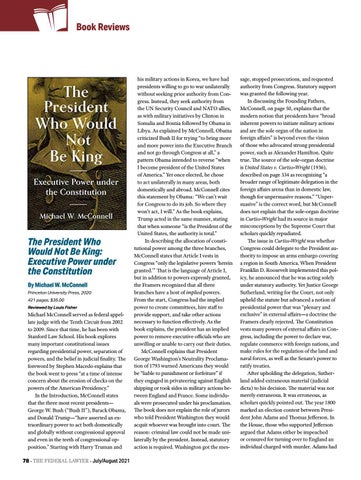Book Reviews
The President Who Would Not Be King: Executive Power under the Constitution By Michael W. McConnell Princeton University Press, 2020 421 pages, $35.00
Reviewed by Louis Fisher
Michael McConnell served as federal appellate judge with the Tenth Circuit from 2002 to 2009. Since that time, he has been with Stanford Law School. His book explores many important constitutional issues regarding presidential power, separation of powers, and the belief in judicial finality. The foreword by Stephen Macedo explains that the book went to press “at a time of intense concern about the erosion of checks on the powers of the American Presidency.” In the Introduction, McConnell states that the three most recent presidents— George W. Bush (“Bush II”), Barack Obama, and Donald Trump—“have asserted an extraordinary power to act both domestically and globally without congressional approval and even in the teeth of congressional opposition.” Starting with Harry Truman and 78 • THE FEDERAL LAWYER • July/August 2021
his military actions in Korea, we have had presidents willing to go to war unilaterally without seeking prior authority from Congress. Instead, they seek authority from the UN Security Council and NATO allies, as with military initiatives by Clinton in Somalia and Bosnia followed by Obama in Libya. As explained by McConnell, Obama criticized Bush II for trying “to bring more and more power into the Executive Branch and not go through Congress at all,” a pattern Obama intended to reverse “when I become president of the United States of America.” Yet once elected, he chose to act unilaterally in many areas, both domestically and abroad. McConnell cites this statement by Obama: “We can’t wait for Congress to do its job. So where they won’t act, I will.” As the book explains, Trump acted in the same manner, stating that when someone “is the President of the United States, the authority is total.” In describing the allocation of constitutional power among the three branches, McConnell states that Article I vests in Congress “only the legislative powers ‘herein granted.’” That is the language of Article I, but in addition to powers expressly granted, the Framers recognized that all three branches have a host of implied powers. From the start, Congress had the implied power to create committees, hire staff to provide support, and take other actions necessary to function effectively. As the book explains, the president has an implied power to remove executive officials who are unwilling or unable to carry out their duties. McConnell explains that President George Washington’s Neutrality Proclamation of 1793 warned Americans they would be “liable to punishment or forfeiture” if they engaged in privateering against English shipping or took sides in military actions between England and France. Some individuals were prosecuted under his proclamation. The book does not explain the role of jurors who told President Washington they would acquit whoever was brought into court. The reason: criminal law could not be made unilaterally by the president. Instead, statutory action is required. Washington got the mes-
sage, stopped prosecutions, and requested authority from Congress. Statutory support was granted the following year. In discussing the Founding Fathers, McConnell, on page 50, explains that the modern notion that presidents have “broad inherent powers to initiate military actions and are the sole organ of the nation in foreign affairs” is beyond even the vision of those who advocated strong presidential power, such as Alexander Hamilton. Quite true. The source of the sole-organ doctrine is United States v. Curtiss-Wright (1936), described on page 334 as recognizing “a broader range of legitimate delegation in the foreign affairs arena than in domestic law, though for unpersuasive reasons.” “Unpersuasive” is the correct word, but McConnell does not explain that the sole-organ doctrine in Curtiss-Wright had its source in major misconceptions by the Supreme Court that scholars quickly repudiated. The issue in Curtiss-Wright was whether Congress could delegate to the President authority to impose an arms embargo covering a region in South America. When President Franklin D. Roosevelt implemented this policy, he announced that he was acting solely under statutory authority. Yet Justice George Sutherland, writing for the Court, not only upheld the statute but advanced a notion of presidential power that was “plenary and exclusive” in external affairs—a doctrine the Framers clearly rejected. The Constitution vests many powers of external affairs in Congress, including the power to declare war, regulate commerce with foreign nations, and make rules for the regulation of the land and naval forces, as well as the Senate’s power to ratify treaties. After upholding the delegation, Sutherland added extraneous material (judicial dicta) to his decision. The material was not merely extraneous. It was erroneous, as scholars quickly pointed out. The year 1800 marked an election contest between President John Adams and Thomas Jefferson. In the House, those who supported Jefferson argued that Adams either be impeached or censured for turning over to England an individual charged with murder. Adams had









